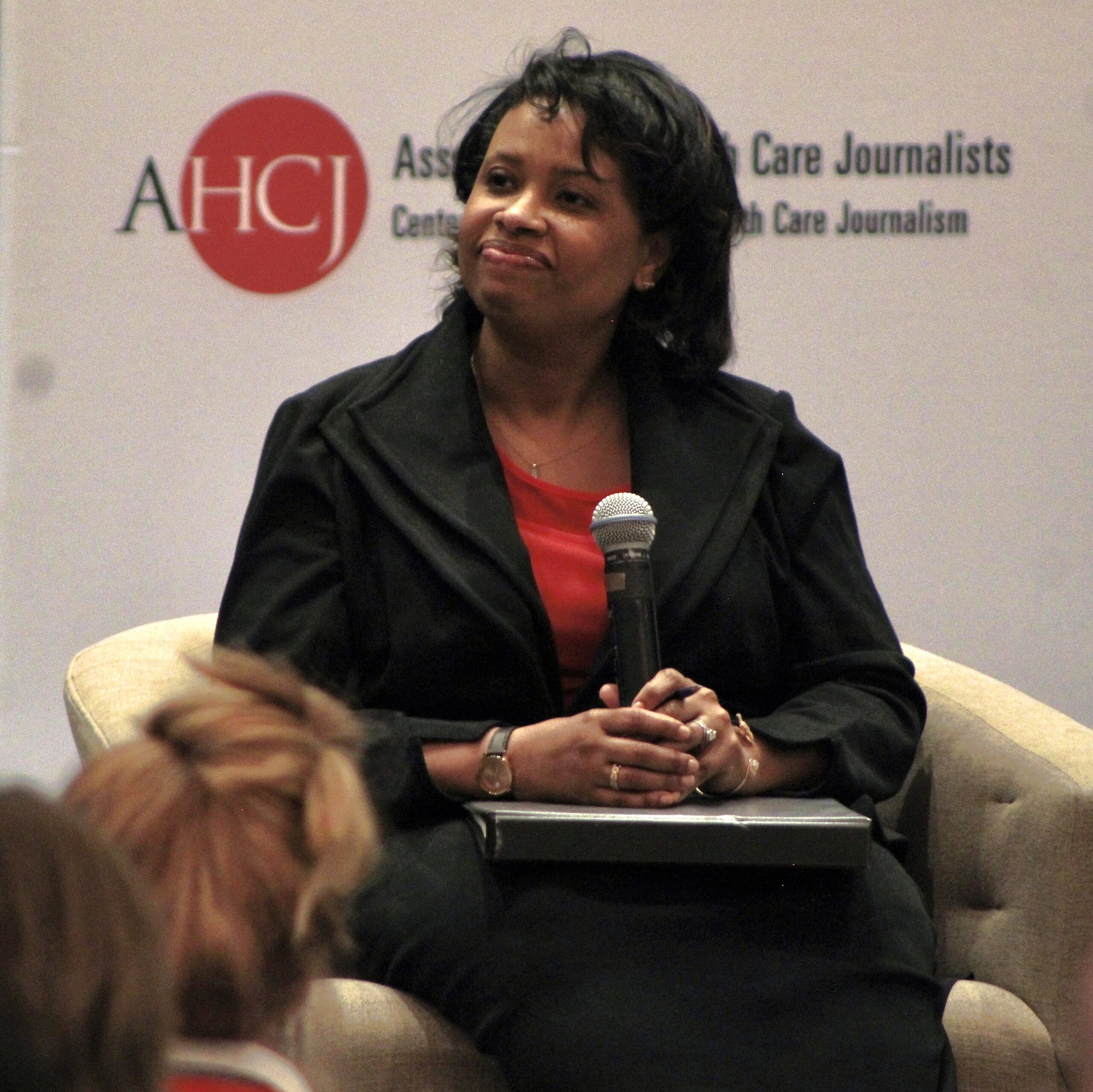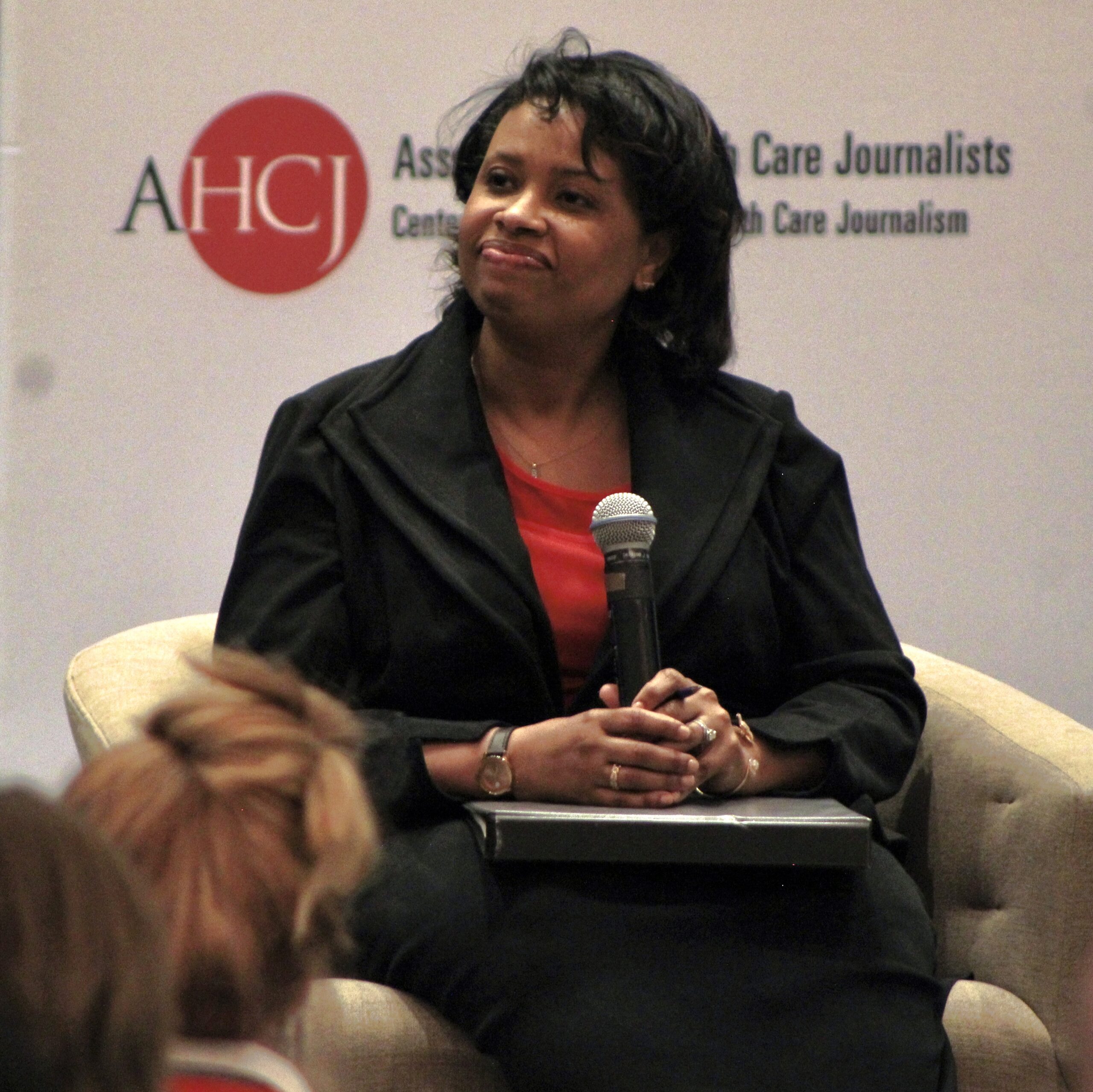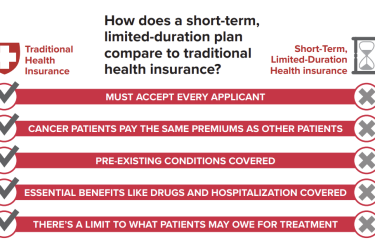
Chiquita Brooks-LaSure, administrator for the Centers for Medicare and Medicaid Services (CMS), opened AHCJ’s Health Journalism 2022 conference on Thursday, April 28, with a keynote address highlighting the importance of health care and CMS’s efforts to foster greater equity, access, and value, and how much health care is integrated into the fabric of our society.
Check out the full video of her speech and Q&A.
In her remarks, Brooks-LaSure explained just how much health care is part of the fabric of our society. While many people have been touched by the health system, many are still left out. The Affordable Care Act — in which Brooks-LaSure played a key policy role in developing and implementing — has certainly transformed the health system. However, there’s still too much inequity and multiple challenges to address. Brooks-LaSure has put forth six pillars to guide the agency’s thinking about their work and to ensure CMS measures results to ensure they are pursuing initiatives that address underlying disparities in the health system.
Following her brief opening remarks, Brooks-LaSure answered questions from the audience. Reporters took advantage of the opportunity to probe issues including Medicaid expansion, maternal mortality and CMS’s controversial decision to cover the newly approved Alzheimer’s drug Aduhelm only for those enrolled in clinical trials.
“I think it’s really important for people to understand that this was unique,” she said, referring to the Aduhelm decision. Normally, coverage decisions are made at a local level, but in this instance, CMS was asked to make a broader decision on this particular drug.
“It’s our responsibility as part of that process to determine whether something is reasonable and necessary for the treatment of the illness, in this case, Alzheimer’s.” She added that CMS has a very distinct responsibility that is different from what the FDA is responsible for. While coverage decisions are common practice on the medical device side, CMS has not been asked to do so on the drug side before. Prior to issuing a final decision, she said her staff reviewed some 10,000 comments and met with multiple stakeholders.
Brooks-LaSure repeatedly stressed that CMS will reconsider covering this drug, or others in its class when the FDA gives full approval. And there is additional data on safety and efficacy. She also assured the audience that CMS will pivot quickly if evidence develops that this drug or others like it work.
Medicaid expansion a priority
One of CMS’s key priorities is keeping people covered under Medicaid. The agency is focused on maintaining the coverage levels that we currently see because we are at record levels. “I like to say I don’t care what people are eligible for. I just want to make sure if people are eligible that we’re keeping them or getting them into coverage,” Brooks-LaSure said.
Both CMS’ Medicaid and marketplace teams are working with states to provide more clarity about flexibility under the American Rescue Plan to insure more people. “I know sometimes I’m an optimist, but I’m really committed to working with Congress to make sure we bridge the coverage gap and hold on to the ACA subsidies because they’ve made a huge difference in the affordability and the ability of people at the lower income levels.”
Following hundreds of thousands of nursing home resident and worker deaths from COVID-19, and several key reports calling for nursing home overhaul, Brooks-LaSure underscored CMS’s commitment to partnering with stakeholders to improve quality and safety. Among the most significant policies slated for revamping by the agency is nursing home staffing.
“We have committed to proposing a standard next year, and it’s one that we are really wanting to gauge and already hearing how much this is a part of quality,” she said. The agency is also improving transparency, adding additional information to Nursing Home Compare so that family caregivers can know what staff turnover looks like, and is releasing more information about nursing homeownership.
Maternal mortality, a major focus
Another priority is maternal mortality. CMS is striving to standardize data collection across programs, which is a particular challenge for maternal health, given how various states report these deaths. The agency is also working closely with states to adopt new authority under the American Rescue Plan to ensure postpartum women get care for 12 months following birth. So far, over a dozen states are engaging with CMS on this issue. “That’s not sufficient, but we think it’s so core to making sure they get care,”QA1 she said.
Brooks-LaSure also addressed questions on:
• Social determinants of health: CMS is partnering with other federal agencies, states and private organizations to address factors like housing or other underlying social concerns that impact health.
• Demonstration projects from the CMS Innovation Center which often cannot be expanded without Congressional approval and funding. “Just because an idea works sometimes, we’re not always able to bring it over to the core part of the program without Congress giving us the authority to do that.” However, she pointed out that states can often implement many of these innovative programs on their own, and CMS is working with many state governments to expedite the process.
• Value-based payments: CMS is committed to moving their programs, particularly Medicare, into more of an accountable care model while ensuring that people are getting the care they need. Engaging with stakeholders will help them figure out how to encourage that. “So, the Medicare Shared Savings Program is in the same bucket as a lot of our work on ECRH and other models where we’re really trying to engage to really make sure that it’s a value proposition to people as well as providers,” she said.
When questioned about the Build Back Better plan — which addresses many of the issues brought up during the Q&A — Brooks-LaSure insisted “Build Back Better is not dead.”
She remains optimistic that some version of the bill will still pass. However, a bitterly divided Congress makes this outcome truly questionable. And, while rarely deviating from CMS talking points, it was clear that she was personally committed to advancing health equity, improving maternal mortality, and building on the success of the Affordable Care Act, especially through Medicaid expansion.
Several reporters pushed the administrator for more specifics regarding improved data collection, payments and Medicaid expansion, but Brooks-LaSure would only go so far — and several times declined to go into more details.










